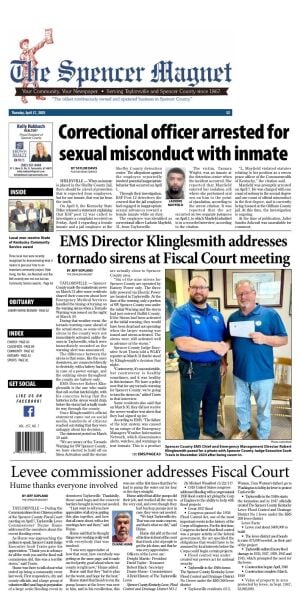We’re in the home stretch, but plenty of work remains to be done. With just four legislative days before the veto period, things are moving quickly. Bills are being debated, final votes are happening, and we’re working hard to pass legislation that will impact Kentucky families, businesses, and communities. The next few legislative days will be fast-paced, and I want to keep you informed as we make the final push.
At this point in the session, we’ve shifted our focus to hearing a large batch of House bills in committee and on the Senate floor. Just as the House is working through Senate bills, we’re carefully reviewing their legislation to ensure it aligns with the priorities of Kentuckians.
This week also brought a great reminder of why this work matters, as students from across the state visited the Capitol for Kentucky Youth Advocacy Week. It’s always inspiring to see young Kentuckians engage in the legislative process and share their vision for the future.
This week, I was proud to see Senate Bill (SB) 136 pass the Senate and move us closer to modernizing Kentucky’s vehicle registration, insurance valuation process. This comprehensive transportation bill streamlines bureaucratic processes, improves fairness for drivers, and expands services to better serve Kentuckians.
One of the key provisions of SB 136 is a clean-up of Kentucky’s Automated Vehicle Information System (KAVIS) to help county clerks and the Transportation Cabinet process vehicle registrations and title applications more efficiently. It also requires the Department of Revenue to establish emergency regulations allowing insurers to use nationally accepted valuation guides when determining the value of a totaled vehicle. This change brings consistency and fairness to the insurance claims process to make sure Kentucky drivers receive accurate compensation.
Additionally, SB 136 expands the Kentucky State Police driver’s testing pilot program and increases the number of participating counties to make it easier for Kentuckians to complete their driving exams.
This bill is about efficiency, transparency, and accessibility. Modernizing outdated processes makes it easier for Kentuckians to register vehicles, navigate insurance claims, and obtain essential identification.
Additionally, my SB 9 passed this week. It strengthens the Kentucky Teachers’ Retirement System by standardizing sick leave policies, capping pensionable sick leave at 12 days per year, and requiring districts to cover the costs of additional leave. It also mandates 30 days of maternity leave by 2030, ensures TRS reports sick leave liabilities, and allows state audits for oversight. The bill aligns administrator leave policies with teacher leave policies to improve pension sustainability and fairness.
Below are several other bills that passed the Senate this week that the Kentucky state House of Representatives may now take up.
SB 257 is a bill I co-sponsored. It creates the Office of Government Efficiency within the Auditor of Public Accounts Office to identify waste, improve cost-effectiveness, and enhance transparency. It formalizes the auditor’s structure, authorizes staffing and funding for efficiency initiatives. The bill builds on a decade of legislative efforts to ensure fiscal discipline, strengthen pensions, boost reserves, and lower income taxes.
SB 266, which I co-sponsored, allows Kentucky State Police (KSP) troopers to take off-duty law enforcement jobs with commissioner approval and department regulations to prevent conflicts of interest. It also permits state-owned vehicles with regular plates and sets policies on uniforms, equipment, and facilities.
SB 1 establishes the Kentucky Film Office within the Cabinet for Economic Development to attract film and television productions, streamline permits, coordinate incentives, and market Kentucky as a filming destination. It creates the Kentucky Film Leadership Council to oversee tax incentives and industry policies.
SB 3 updates Kentucky’s NIL laws to align with anticipated legal settlements, allowing student-athletes to receive direct compensation through agreements with universities. It sets fair market standards, permits sublicensing of NIL rights, and includes an emergency provision for immediate implementation.
SB 6 improves education funding transparency by requiring the SEEK formula to include state-paid fringe benefits in per-pupil funding calculations. This will provide a more accurate picture of taxpayer investment. The changes take effect July 1, 2026.
SB 7, the Right of Publicity Act, prohibits the unauthorized commercial use of unclothed images of individuals, living or deceased, in Kentucky. It allows legal action for misuse, exempts cloud and internet service providers, and preserves First Amendment protections for journalism, art, and entertainment.
SB 58 allows special needs trusts to receive lifetime retirement benefits from Kentucky’s public pension systems without affecting government assistance. It ensures trustees can manage payments, requires notification upon a beneficiary’s death, and prevents annuity funds from reimbursing Medicaid. Retirement systems may establish regulations for implementation.
SB 63 allows street-legal special-purpose vehicles on certain public roads under safety and registration conditions. It prohibits use on interstates and parkways, requires inspections, and exempts farm-use vehicles from registration.
SB 68 reduces school administrative burdens by eliminating certain reporting requirements, clarifies school board tax authority, expands career and technical education, and repeals outdated statutes.
SB 93 requires private insurers, Medicaid, KCHIP, state employee, and university health plans to cover hearing aids and services for children starting Jan. 1, 2026. It mandates at least one hearing aid per ear with a $2,500 minimum per device, consults the Kentucky Commission on the Deaf and Hard of Hearing on coverage levels, adjusts cost-sharing for higher-priced devices, and sets network adequacy standards for pediatric audiologists.
SB 130 creates new criminal offenses for gift card fraud, making it a Class D felony to tamper with or steal gift cards. It defines "face value" for prosecution and strengthens law enforcement tools to combat financial fraud.
SB 133 enhances combat sports oversight by redefining "exhibition," requiring sanctioning bodies to notify the Kentucky Boxing and Wrestling Commission of events, and strengthening regulatory compliance.
SB 144 bans the resale of firearms used in homicides and requires their destruction within 90 days of a court order. It also allows KSP to destroy unsafe, defaced, or contaminated firearms to prevent them from re-entering circulation.
SB 153 sets standards for prepayment claims review in Medicaid to prevent improper payments, increase oversight, and reduce fraud. It requires compliance with state regulations and, if necessary, federal approval.
SB 162 strengthens unemployment fraud prevention by mandating notification of suspected fraud, disqualifying individuals under investigation from benefits, and tightening misconduct-related termination rules.
SB 181 establishes traceable communication systems for school employees and volunteers when messaging students, requires parental notification, and mandates reporting of unauthorized communication to school officials and the Educational Professional Standards Board.
SB 183 requires proxy advisers working with state retirement systems to prioritize financial outcomes over environmental, social, and governance—also known as ESG—activism, mandates economic analysis for certain shareholder votes, and reduces reliance on politically motivated investment decisions.
SB 190 expands charitable gaming by increasing the number of allowable bingo sessions from two to three per week and extending the maximum weekly gaming hours from 10 to 15. The changes would take effect July 1.
SB 193 requires the secretary of state to issue a jailer service card to individuals who served as elected or appointed jailers, provided they were not removed from office or disqualified.
SB 202 regulates cannabis-infused beverages to protect consumers and establish oversight under The Kentucky Department of Alcohol Beverage Control. It limits products to 5 mg per serving, requires a University of Kentucky Cannabis Center report by Nov. 1, and allows existing inventory exceeding the new limits to be sold until May 1.
SB 207 creates a waiver process for public schools to implement innovation strategies. This process allows them to tailor academic offerings, expand programs, and apply for state-approved flexibilities while maintaining oversight.
SB 218 improves financial transparency by directing the Kentucky Department of Revenue to create an online hub for local government spending and tax information. It requires public access by 2026.
SB 237 exempts experienced out-of-state law enforcement officers from Kentucky’s physical agility test for peace officer certification to ease recruitment while maintaining professional standards.
Senate Joint Resolution 66 establishes the Air Mobility and Aviation Economic Development Task Force.
Senate Concurrent Resolution 67 directs the Legislative Research Commission to create the Disaster Prevention and Resiliency Task Force to study disaster mitigation and infrastructure resilience. The task force must produce a report by December 1.
Several House measures were delivered to the Governor’s desk.
House Bill (HB) 191 expands eligibility for burial in Kentucky state veterans' cemeteries to certain National Guard and Reserve members and their families, aligning with federal standards. Takes effect Jan. 1, 2026.
HB 216 allows Department of Agriculture employees (excluding Kentucky Office of Agricultural Policy staff) to apply for funds, awards, or contracts from the office. It includes an emergency provision.
HB 219 requires emergency medical providers to receive sexual assault emergency response training but does not mandate certification.
HB 234 expands Kentucky Office of Homeland Security grants to airport security personnel. It directs firearm sale funds toward protective gear and technology to enhance safety and policing.
HB 241 provides school districts relief from excessive closures by granting up to five additional NTI days, allowing extended school days, and waiving certain instructional day requirements. It prevents KDE from limiting virtual program enrollment.
HB 261 permits retired CPAs to provide unpaid services such as tax preparation and nonprofit board participation without forfeiting their CPA license.
HB 262 allows small CPA firms to retain the name of a deceased or retired owner.
HB 391 increases the threshold for selling pure Kentucky honey without regulatory permits from 150 to 500 gallons to support small-scale beekeepers.
House Concurrent Resolution 20 directs the Legislative Research Commission to study access to Sexual Assault Nurse Examiners (SANE) in Kentucky, with training led by the state’s Sexual Assault Response Team Advisory Committee.
Once we wrap these final legislative days, we’ll enter the veto period to give the Governor time to review the bills we’ve sent to his desk. He can sign them into law, let them take effect without his signature, or issue a veto. When we return for the remaining two days of session, the legislature can override any vetoes with a majority vote in both chambers. This ensures that our work isn’t undone at the last minute, and the policies we’ve worked hard to pass stay on track.
Thank you for allowing me to serve you in the Kentucky Senate. Please contact my office at 502-564-8100 or Jimmy.Higdon@kylegislature.gov if you have any questions, concerns, or ideas.
Sen. Jimmy Higdon, R-Lebanon, represents the 14th Senate District, including LaRue, Marion, Nelson, Spencer, and Washington Counties. Higdon serves as chair of the Senate Transportation Committee, overseeing efforts to craft biennial road plans, advance Kentucky’s transportation infrastructure, and improve public safety. He also serves as Senate co-chair of the Public Pension Oversight Board, focusing on stabilizing and strengthening Kentucky’s pension systems through reform and surplus investment. Additionally, Higdon is a member of the Senate Committees on Education; Veterans, Military Affairs, and Public Protection; and Licensing and Occupations. During the 2024 interim, he served as a Kentucky Housing Task Force member.














